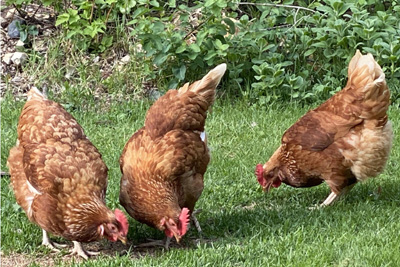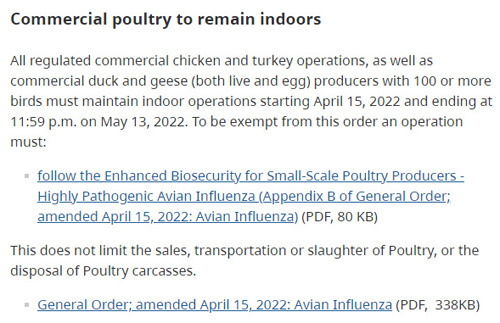
Friday April 29, 2022 | VICTORIA, BC
by Mary P Brooke | Island Social Trends
H5N1 has been found in another small poultry flock in BC. Announced today April 29, the flock is in the Regional District of Central Kootenay, where domestic birds have tested positive for the highly pathogenic H5N1 avian influenza virus.
On Monday April 25, BC Agriculture and Food announced a case of poultry H5N1 infection in a small backyard flock in Kelowna, as confirmed by the Canadian Food Inspection Agency (CFIA).
Prior to today, the CFIA has confirmed the presence of highly pathogenic avian influenza (AI), subtype H5N1, in the following locations in British Columbia:
- April 25, 2022 – City of Kelowna (small flock)
- April 13, 2022 – Regional District of North Okanagan (poultry flock)
Working with CFIA:
B.C.’s Ministry of Agriculture and Food is working closely with the CFIA and BC poultry producers to ensure enhanced prevention and preparedness measures are in place to protect poultry flocks in BC.
Infected premises under quarantine:
In both instances, the infected premises is reported as having been placed under quarantine by the CFIA and the ministry has notified producers within a 12-kilometre radius of the positive test result.
No co-mingling:
Bird owners must not take their birds to commingling events starting April 28, 2022 and ending at 11:59 p.m. on May 19, 2022.
That order applies province-wide to all backyard, small flock and commercial bird producers of poultry, domestic waterfowl, doves, and ratites.
Backyard flocks at potential risk:
Owners of small or backyard flocks are urged to continue to be vigilant and have appropriate preventative measures in place.
Measures include eliminating or reducing opportunities for poultry to encounter wild birds, reducing human access to the flock, and increased cleaning, disinfection, and sanitization of all things (including clothing and footwear) when entering areas where flocks are housed.
Wild birds have also died of H5 infections:
Seven wild birds that died between April 20 and 27 have also tested positive for H5 strains of avian influenza, said BC Agriculture and Food today. That includes three snow geese and one Canada goose in the Vanderhoof area, and individual bald eagle in each of Lac la Hache (near 100 Mile House), Bowen Island and Vancouver. These cases follow a similar finding in a bald eagle in Delta this month, and one in Vancouver in February.
Those findings were proted through BC’s wild bird mortality surveillance program which gathers samples from sick and dead birds as well as sediment samples from wetlands the birds gather on. The surveillance is a partnership between different federal and provincial agencies and the Canadian Wildlife Health Cooperative.
Federally regulated disease:
Avian influenza is a federally regulated disease and the CFIA leads the investigation and response with provincial support for testing, mapping, surveillance and disposal.
Usually no impact on humans:
“Bird flu is caused by a type of influenza virus that rarely infects humans,” says the Mayo Clinic about avian influenza on their website.
“More than a dozen types of bird flu have been identified, including the two strains that have most recently infected humans — H5N1 and H7N9. When bird flu does strike humans, it can be deadly,” states the Mayo Clinic.
“Health officials worry that a global outbreak could occur if a bird flu virus mutates into a form that transmits more easily from person to person. Researchers are working on vaccines to help protect people from bird flu,” it is stated by the Mayo Clinic.
Contact info:
The following contact information can be found on the ministry website, but is provided here for quick access:
- The BC Ministry of Agriculture and Food provides diagnostic services for commercial and small flock poultry, please call: 1 800-661-9903 to report unexplained poultry illnesses or mortalities.
- Small and backyard flock owners with general inquiries should call the Small and Backyard Flock Permitting Hotline: 604 855-8255. * The Wild Bird Mortality Investigation Program hotline at 1 866-431-2473 accepts public reports of dead wild birds.
===== GOVERNMENT LINKS:
Ministry of Agriculture and Food information on avian Influenza, including what to be on the lookout for, resources for small flock owners, deputy chief veterinarian orders and information about testing: https://www2.gov.bc.ca/gov/content/industry/agriculture-seafood/animals-and-crops/animal-health/reportable-notifiable-diseases/avian-influenza-ai
CFIA information on current state of avian influenza in Canada: https://inspection.canada.ca/animal-health/terrestrial-animals/diseases/reportable/avian-influenza/response-to-detections-of-highly-pathogenic-avian-/eng/1640207916497/1640207916934
CFIA fact sheet on avian influenza: https://inspection.canada.ca/animal-health/terrestrial-animals/diseases/reportable/avian-influenza/fact-sheet/eng/1356193731667/1356193918453#a2






